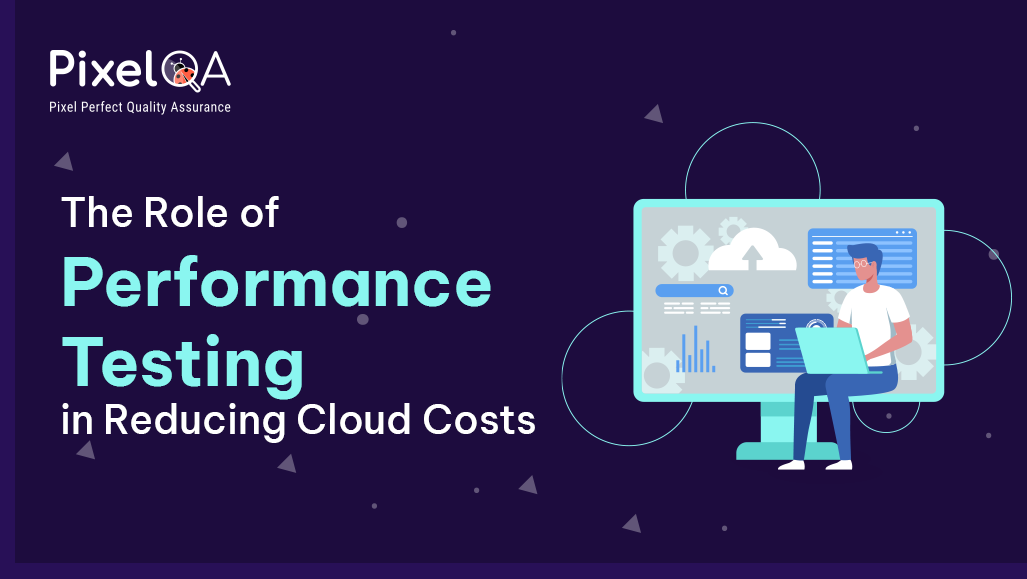
Table of Content
- Introduction
- What is Performance Testing?
- How Performance Testing Helps Reduce Cloud Costs
- Final Thoughts
- Conclusion
Introduction
Enterprises can use cloud computing to run their apps without having to purchase pricey hardware. But sometimes, cloud bills can get high especially when resources are not used efficiently. This is where performance testing services plays an important role. It helps reduce cloud costs while making sure your applications run smoothly.
What is Performance Testing?
Performance testing checks how fast and stable your application is under different conditions. It helps you understand:
- How your app behaves when many users use it at once
- How much memory, CPU, and network your app uses
- Where the slow parts or bottlenecks are
Some common types of performance testing are:
- Load Testing: Checks how the app performs under expected traffic
- Stress Testing: Pushes the app beyond its limits to see how it breaks
- Scalability Testing: Ensures the app can grow with more users
- Spike Testing: Tests how the app handles sudden increases in traffic
How Performance Testing Helps Reduce Cloud Costs
1. Right-Sizing Resources
Many companies pay for more cloud resources than they need. Performance testing shows how much CPU, RAM, and bandwidth your app actually needs. This helps you choose the right size for your cloud servers, not too big, not too small.
Result: You stop overpaying for unused resources.
2. Detecting and Fixing Inefficiencies
Performance testing helps find slow or inefficient code that uses too many resources. By fixing these issues, your app will use less power and run faster.
Result: Lower resource consumption means lower cloud bills.
3. Optimizing Auto-Scaling
AWS and Azure are examples of cloud platforms that enable auto-scaling, which adds or removes resources in response to demand. Performance testing aids in optimizing auto-scaling rules so that your application rapidly scales down during periods of low traffic and only scales up when required.
Result: You pay only for what you actually use.
4. Preventing Unexpected Failures
Without performance testing, an app may crash under high load causing downtime, user dissatisfaction, and emergency scaling (which costs more). Testing ahead of time ensures your app handles traffic smoothly.
Result: Avoids surprise cloud costs and customer complaints.
5. Better Capacity Planning
Performance tests provide data on how your app grows with more users. This helps you plan your infrastructure wisely without guessing.
Result: Smart planning avoids both overuse and underuse of cloud resources.
Final Thoughts
Performance testing is not just about speed it's also about saving money. When done correctly, it helps you:
- Use the cloud efficiently
- Avoid waste
- Improve user experience
- Prepare for growth
If you're using the cloud, make performance testing a regular part of your QA process. It can help your app run better and reduce your cloud bills at the same time.
Conclusion
While cloud services are very flexible, expenses can easily get out of control if they are not properly managed. In order to find Incapability, optimize resource utilization, and make sure your application functions properly under various circumstances, performance testing is essential. Businesses may reduce cloud expenses, avoid overpaying for underutilized resources, improve user experience, and make more informed decisions about scaling by conducting performance testing on a regular basis. Performance testing is a wise investment that helps you save money and run your applications more efficiently; in other words, it's not just about speed.
About Author
Nikul Ghevariya is a dedicated QA Executive at PixelQA a Software Testing Company, evolving from a trainee to a valuable contributor across diverse projects. With ambitious goals, he aspires to master new QA tools, and delve into Automation and API testing, showcasing an unwavering commitment to continuous learning.

_638833343840039900.png)